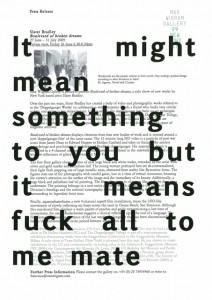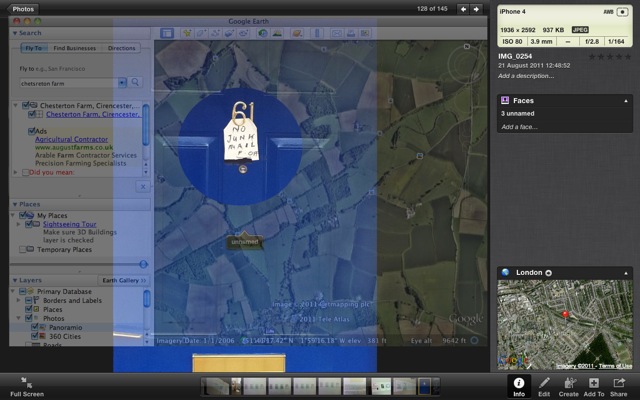I know there is one where women rule. Perfect matriarchy, with women sleeping with everyone and men looking after children. It is in some jungle in Africa, or maybe in South America. I heard there is another one where everyone shares everything, in some sort of perfect communism without bureaucracy or secret police. And there must be another one where people with mental or physical disabilities are treated like gods. Not sure where that one is, or how many people are there. Anyway, all of them, all these isolated tribes lost in jungles, I am sure, live in perfect harmony with nature, their spiritual selves, each other, the universe, animals, women, wealth…
On this side of the planet, where isolation is just an urban disease, newspapers and magazines pullulate with stories of isolated tribes. Nobody can resist the beautiful melancholy of pictures of naked man in the wilderness, threatened by deforestation and by the advance of civilization. Nobody, not even charities or governments. With unanimous emotion, western civil societies do not save on tears and petitions to save the last few members of these mythical, uncontaminated tribes.
It was not with a cynical prejudice, but rather with mere curiosity, that I started asking myself what was the reason behind this interest, which seems to me (at least numerically) disproportionate to that granted to the huge masses of the local dispossessed in the ‘non-isolated’ world. If not a measured calculation of the ‘greatest amount of happiness for the greatest number of people’, to quote Bentham, then, what other reasoning is there behind such an obsession with saving isolated tribes from destruction and from us?
Like in detective stories, we must return to the crime scene to understand who killed whom, and why. This is a very strange case of murder, though. One where the investigation aims at uncovering what reasons the murder had for trying so hard not to kill his victims, but actually to keep them alive as long as possible. There is something morbid in this paradoxical attempt. And morbidity itself is the clue that might lead us to the real crime scene, miles and miles away from jungles and deserts. In fact, in a completely different universe.
Following the path of the morbid desires of western societies, we will soon find ourselves in the middle of a dangerous place, crowded with all sorts of impulses and desires, which we might call the collective mind. Although it is difficult to move through this cloudy landscape, it will not be too hard to find the responsible of this collective obsession. After all, its size is notoriously huge and its name is known to most: frustration. Like most criminals, it often uses other names as well: impotence, excuse, procrastination.
What has this collective feeling of justification and frustration to do with the interest in protecting isolated tribes? It might help to have a look at the way another detective, before us, named some of its victims, those which Lacan called ‘the subjects supposed to believe’. According to Lacan, it is common practice to attribute to others certain beliefs which we do not want to fully take upon us, and yet which we do not want to fully give up either. Think of Santa Claus and the way children are supposed to believe in it. Or, to get to the point, think of our isolated tribes and the extraordinary qualities they are supposed to have.
Common sense states that there is no such thing as selflessness. This all-encompassing selfishness, though, should also include that of the masochistic type. What is the role, or better the use, for western civil societies of these uncontaminated jungle dwellers? How is this masochistic for us? In our search for answers, we can start interrogating our main suspect, that morbid feeling of the collective mind. What is it trying to hide? By its nature, frustration (aka impotence, excuse, procrastination) is an internalized self-justification of the inability – or of the lack of will – to perform certain actions and achieve certain results. Frustration is the declaration of a defeat, the transformation of a temporary failure into a permanent condition of existence. If we put it in front of the pure-hearted natives ‘supposed to believe’, we can have a glimpse of what is the motif behind this obsessive, murderous care: hiding a defeat.
However, even if we now know that it was defeat that commissioned the murder, we still haven’t found who was the real victim of this homicide. Because this is indeed a strange case, one where we have, on the one hand, a victim forced to survive, and yet, on the other, we have another one forced to die. Defeat is a serial killer, and its targets are always the same: any imaginable possibility. Keeping alive those isolated tribes, defeat secures its paralyzing domination over the collective mind through the perfect balance of frustration and sublimation. Who needs to panic about our lack of harmony with nature, women, wealth or each other, if there is someone, somewhere in the jungle, who is doing it so well for us? The world would be a very dark, hopeless place, if it wasn’t for those beautiful, uncontaminated people who are living the dream. Our dream. It is thanks to them that we can sleepwalk through our days as if it didn’t really matter, as if our constant inability to concretize possibilities wasn’t a murder of our own nature, but just a slightly disturbing procrastination.
Samurai, in Medieval Japan, used to live according to a strict discipline, the first principle of which was that of waking up every day as if already dead. For the dead there is no hope, therefore there is no fear. But getting rid of hope doesn’t only mean doing without fear. Most importantly, it means to be forced to face the urgency of what does not exist. In a world without hope, what does not exist will never appear, unless it is purposefully brought into life. Such a realization infallibly leads to panic. However, despite its frequent interpretation as a state of paralysis, panic, if brought to its highest peak of existential anxiety, can have the effect of an incredible stimulus. In the pinnacle of panic, action, however impossible, becomes necessary. In other words, put in front of the realization that alternative lifestyles and alternative political systems are not in place at the moment, that there are no isolated tribes performing for us all those ideal practices that we are endlessly procrastinating, we will not have any other option but to realize them ourselves. Unless we decide to keep living in an abyss of complete existential desperation.
It is a choice that we must make. Either to keep dreaming or to awake to darkness. It is a choice that requires a sacrifice. That of our innermost oases of hope. We should be grateful that such oases also exist in the physical world. They are in the heart and in the soul of those wonderful, mythical, uncontaminated tribes. Let’s sing with joy at the advance of bulldozers through the virgin rain forests, at the spreading of fires in the deepest areas of the jungle. Let’s hold together the rifles of death squads, as they are hunting down natives along tropical rivers. Killing isolated tribes will kill our dreams. Destroying them will destroy our hope. As the Amazon forest will choke to death under tons of concrete, it will be the very possibility of other, greater wildernesses that will be reborn. As the last, pure hearted native will bleed dry, it will be our very blood that will start to flow again.

